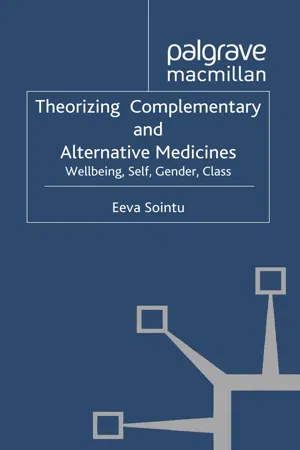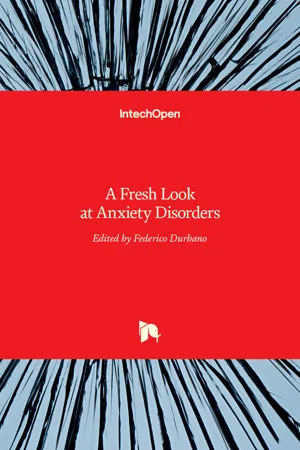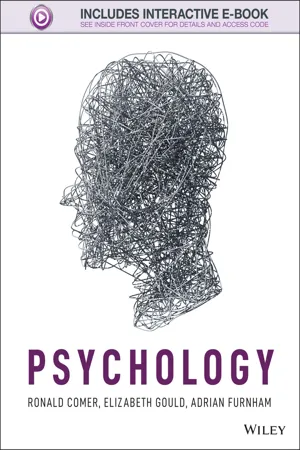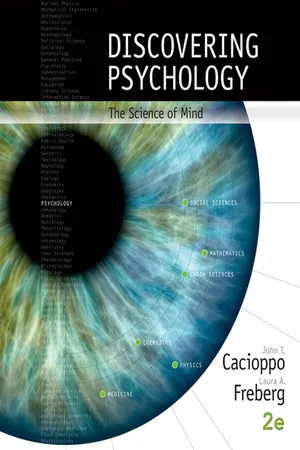Psychology
Alternative Therapies
Alternative therapies refer to non-traditional approaches to healing and wellness that are used in place of or alongside conventional medical treatments. These may include practices such as acupuncture, herbal medicine, meditation, and yoga. While some alternative therapies have gained popularity and shown potential benefits, it is important to approach them with caution and consult with a qualified healthcare professional.
Written by Perlego with AI-assistance
Related key terms
1 of 5
5 Key excerpts on "Alternative Therapies"
- eBook - PDF
Theorizing Complementary and Alternative Medicines
Wellbeing, Self, Gender, Class
- E. Sointu(Author)
- 2012(Publication Date)
- Palgrave Macmillan(Publisher)
As such, this chapter elaborates phenomenological insights as paving the way to better understanding therapeutic effects within the holistic health scene. The centrality of awareness, together with the care afforded to the body, help complementary and alterna- tive health practices to engender bodies that experience pleasure and movement, as well as a sense of connection with other bodies. The nur- turance offered to the body is particularly important in the context of the profound disruption caused by ill health. It is also, however, possible Introduction 13 for practices to give rise to awareness of how the body is socially inscribed. Defining terms While commonly pre-dated by terms like quackery and heresy during the 19th and early 20th centuries, by the 1980s, the term comple- mentary and alternative medicine (CAM) had emerged to define and unite non-biomedical health practices (Ruggie 2004: 29). The width and variety of practices subsumed under the term complementary and alternative medicine is, however, dazzling. Some medical traditions – such as traditional Chinese medicine or Ayurveda – have long and established histories outside the West, while practices like homeopa- thy are old in the Western context. Some therapeutic approaches, such as acupuncture, homeopathy and herbal medicine, have highly orga- nized professional bodies while others are managed in a manner that is more diffuse and fragmented. Some practices focus on the manipulation of the body while others carry a more spiritual component or revolve around the prescription of different kinds of remedies. Consequently, complementary and alternative medicines are not a unified group his- torically, philosophically or in terms of the therapeutic or diagnostic techniques used. - eBook - PDF
- Federico Durbano(Author)
- 2015(Publication Date)
- IntechOpen(Publisher)
In contrast, alternative medicine practices often define health holistically, that is, as a balance of systems – physical, emotional and spiritual involving the whole person. Dishar‐ mony among these systems is thought to cause illness. Treatment involves strengthening the body’s own defenses and restoring these balances. The National Center for Complementary and Alternative Medicine defines CAM as “a group of diverse medical and health care systems, practices, and products that are not generally considered part of conventional medicine ..... Complementary medicine refers to the use of CAM together with conventional medicine and alternative medicine refers to the use of CAM in place of conventional medicine ..... ” [8]. There are five categories of CAM: 1. Alternative medical systems (Ayurveda, naturopathy, homeopathy, acupuncture Chi‐ nese/Oriental medicine), 2. Biologically based therapies (vitamins, herbs, special diets), 3. Mind–body therapies (meditation, biofeedback, hypnosis, imagery, prayer), 4. Energy healing, (Reiki, electromagnetic-based therapies), and manipulative and 5. Body-based therapies (chiropractic, massage, craniosacral therapy) [8]. 3. Prevalence of CAM use The use of CAM has been increasing for decades both worldwide [9] and in the United States, specifically [10], and it currently remains in the 25-50% range [11]. Both Canada and United States are similar with regard to prevalence of CAM use [12]. In 2008, it was reported that 38% of adults over the age of 18 years used some form of CAM, with women being the greater Practical Applications of Complementary and Alternative Therapies in Adults and Youth with Anxiety Disorders http://dx.doi.org/10.5772/61046 271 consumers (43%) compared with men (34%) [11]. Those with psychiatric disorders tend to be high users of CAM and this is particularly true for the patients with anxiety. Bystritsky et al. [13] reviewed the evidence of CAM use in populations with anxiety in 2012. - eBook - PDF
- Ronald Comer, Elizabeth Gould, Adrian Furnham(Authors)
- 2014(Publication Date)
- Wiley(Publisher)
The knowledge acquired is then used by clinicians, whose role is to detect, assess and treat people with psychological disorders. treatment, or therapy systematic procedures designed to change abnormal behaviour into normal behaviour. psychotherapy a treatment system in which a client and therapist use words and acts to overcome the client’s psychologi- cal difficulties. biological therapy the use of physical and chemical procedures to help people over- come psychological difficulties. Despite Frank ’s straightforward definition, clinical treat- ment is surrounded by conflict and confusion. Carl Rogers frequently expressed the opinion that therapists are not in agreement as to their goals or aims; they are not in agree- ment as to what constitutes a successful outcome of their work; they cannot agree on what constitutes a failure; and that the field seems to be completely chaotic and divided. Some clinicians view disorder as an illness and so con- sider therapy a procedure that helps cure the illness. Others see disorder as a problem in living and therapists as teachers of more functional behaviour and thought. Clinicians even differ on what to call the person who receives therapy. Those who see abnormality as an illness use the label patient, while those who view it as a problem in living refer to the client. This chapter will use both of these common terms inter- changeably. All agree therapy of some kind is necessary and will be effective to differing degrees. Treatment in the Modern Context LEARNING OBJECTIVE 1 Explain who currently receives treatment for psychological problems, how they enter treatment and what general features characterize types of treatment. Surveys suggest that more than 15% of people – children, adolescents and adults – receive therapy for psychological problems in the course of a year (NAMI, 2011). The number and variety of problems for which treatments are available have increased during the past 100 years. - eBook - PDF
Discovering Psychology
The Science of Mind
- John Cacioppo, Laura Freberg(Authors)
- 2015(Publication Date)
- Cengage Learning EMEA(Publisher)
For example, a person who is terrified of being part of a crowd might benefit from a combination of psychotherapy and medication for anxiety. As we will see in this chap-here, while others take the form of medication and other biological treatments. The effects of these treatments might have more in common than you think, as in the case of the changes in brain activity that result from the psychological and biological treatments of OCD. Just as we have argued for the advantages of integrating psychological perspectives to understand behavior and mental processes, the field of clinical psychology is recognizing the benefits of applying multiple perspectives to the treatment of psychological disorders. psychotherapy Treatment designed to improve symptoms of psychological disorder through conversation be-tween the therapist and the patient or client. TAGSTOCK1/Shutterstock Chapter 15 | HEALING THE TROUBLED MIND Copyright 2016 Cengage Learning. All Rights Reserved. May not be copied, scanned, or duplicated, in whole or in part. Due to electronic rights, some third party content may be suppressed from the eBook and/or eChapter(s). Editorial review has deemed that any suppressed content does not materially affect the overall learning experience. Cengage Learning reserves the right to remove additional content at any time if subsequent rights restrictions require it. HOW DO PSYCHOLOGISTS PROVIDE THERAPY? 581 ter, different combinations of methods can be tailored to different types of problems and to the individuals being treated. Biological Approaches Biological approaches to treatment have their roots in our under-standing of the biological factors that contribute to psychological disorders. Along with the overall burst of scientific and medical knowledge beginning in the 18th century, scientists began to learn more about psychological disorders and their causes. This knowledge, in turn, set the stage for the discoveries of more effective biological treatments. - eBook - PDF
Psychology and the Challenges of Life
Adjustment and Growth
- Spencer A. Rathus, Jeffrey S. Nevid(Authors)
- 2019(Publication Date)
- Wiley(Publisher)
Courtesy of Dr. Hunter Hoffman Psychodynamic Therapies: Digging Deep Within 403 Had Joanne broken her leg, her treatment by a qualified professional would have followed a fairly standard course. Yet the treatment of psychological problems may be approached from very different perspectives. If she had obtained treatment elsewhere, she might have been: • Lying on a couch talking about anything that pops into her mind and exploring her dreams as a guide to her unconscious mind, seeking the unconscious trauma symbolized by spiders • Sitting face to face with a warm, gentle therapist who accepts Joanne as she is and encour- ages her to do the same • Listening to a frank, straightforward therapist who explains how Joanne’s way of thinking about spiders is creating her anxiety, and how by changing her attitude she can overcome it • Swallowing Valium, Xanax, Ativan, Klonopin, Nembutal, Prozac, or Lexapro • Receiving a combination of these approaches In this chapter we consider these various ways of helping, and we will see that most psy- chologists do not undertake a course of treatment unless it is supported by research evidence. What Is Psychotherapy? We begin with the question, “What is psychotherapy?” Although there are many approaches to psychotherapy, they all have certain common characteristics: • Systematic interaction. Psychotherapy is a systematic interaction between a client and a therapist. The therapist applies a theoretical viewpoint and an understanding of the cli- ent’s cultural and social background in structuring the therapy process. • Psychological principles. Psychotherapy is based on psychological theory and research in areas such as personality, learning, motivation, emotion, and abnormal behavior. • Thoughts, feelings, and behavior. Psychotherapy influences clients’ thoughts, feel- ings, and behavior. It can be aimed at any or all of these aspects of human psychology. • Psychological disorders, adjustment problems, and personal growth.
Index pages curate the most relevant extracts from our library of academic textbooks. They’ve been created using an in-house natural language model (NLM), each adding context and meaning to key research topics.




